For many, anxiety feels like an unpredictable storm — sudden, overwhelming, and impossible to escape. It hijacks your thoughts, disrupts your sleep, makes it difficult to focus, and leaves your nervous system in a constant state of alert. While common treatments may offer temporary relief, they often act as a bandage — covering the symptoms without addressing the root cause. That’s where neurofeedback steps in.
What if anxiety isn’t just an emotional response — but a brain pattern that can be identified, trained, and rebalanced?
It is. And we can see it.
The Brain Map: A Window Into Your Anxiety
Every person’s brain is unique, and so is their experience of anxiety. That’s why we don’t guess—we map your brain.
Using a non-invasive tool called qEEG (quantitative electroencephalogram), we capture and analyze the electrical activity of your brain. This process—commonly referred to as a brain map — reveals where your brain is operating outside of optimal ranges.
In individuals with anxiety, we often see:
- Excessive high-frequency beta waves, especially in the frontal and central brain regions—associated with racing thoughts, hypervigilance, and worry.
- Reduced alpha waves, which are necessary for calm focus and emotional resilience.
- An imbalance between hemispheres leads to overactivation in stress-related networks.
This is the neurological fingerprint of anxiety. It’s not just how you feel — it’s how your brain is firing. As part of our personalized anxiety treatment in Smithtown, a qEEG brain map is often the first step to uncover the underlying brainwave patterns contributing to symptoms.
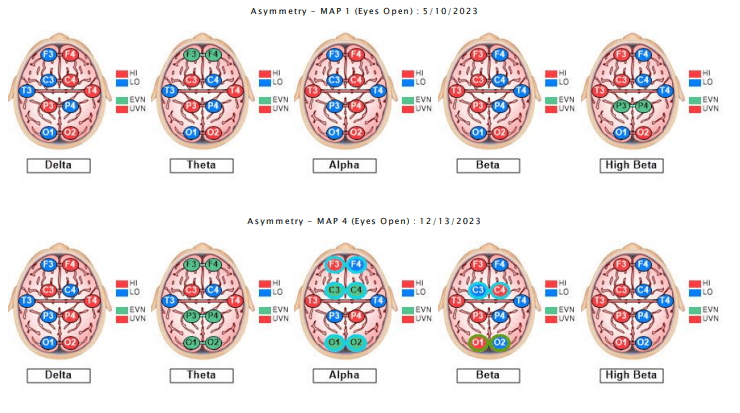
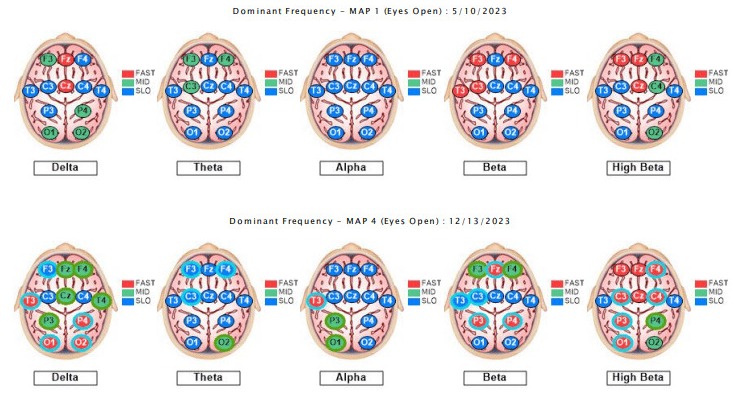
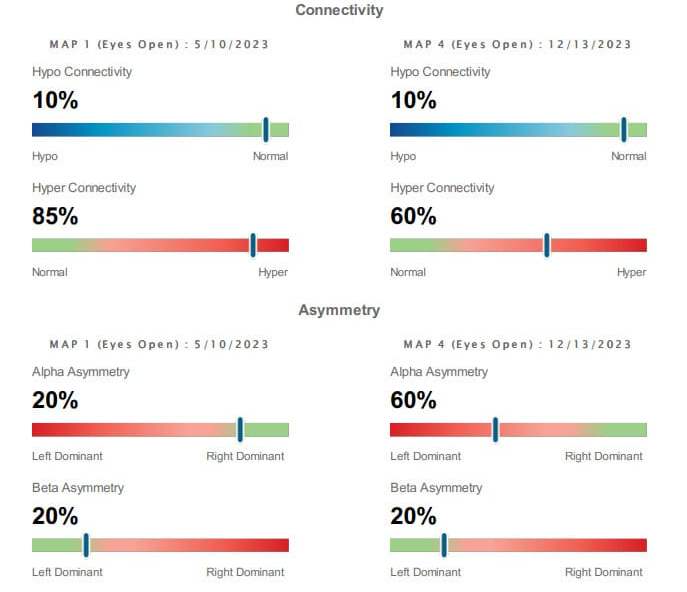
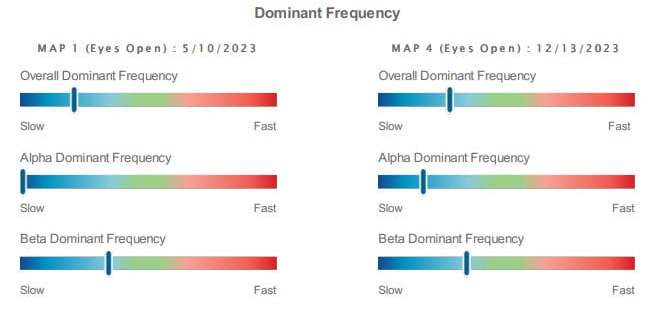
Neurofeedback: Retraining the Brain’s Wiring
Once we know how your brain is functioning, we can begin to train it.
Neurofeedback is a form of brain training that helps your brain learn to regulate itself. During neurofeedback therapy for anxiety sessions, sensors are placed on your scalp to monitor brainwave activity in real time. You then watch a movie or listen to music while your brain’s activity is gently guided toward healthier patterns.
Here’s the magic: when your brain moves into a more balanced state, you get positive feedback—like the screen becoming brighter or the audio playing clearly. When your brain slips back into dysregulated patterns, the feedback changes subtly. Over time, your brain learns. Just like going to the gym strengthens your muscles, neurofeedback is like a gym for your brain—enhancing its flexibility, balance, and performance.
This isn’t about forcing change; it’s about training the brain to function optimally on its own.
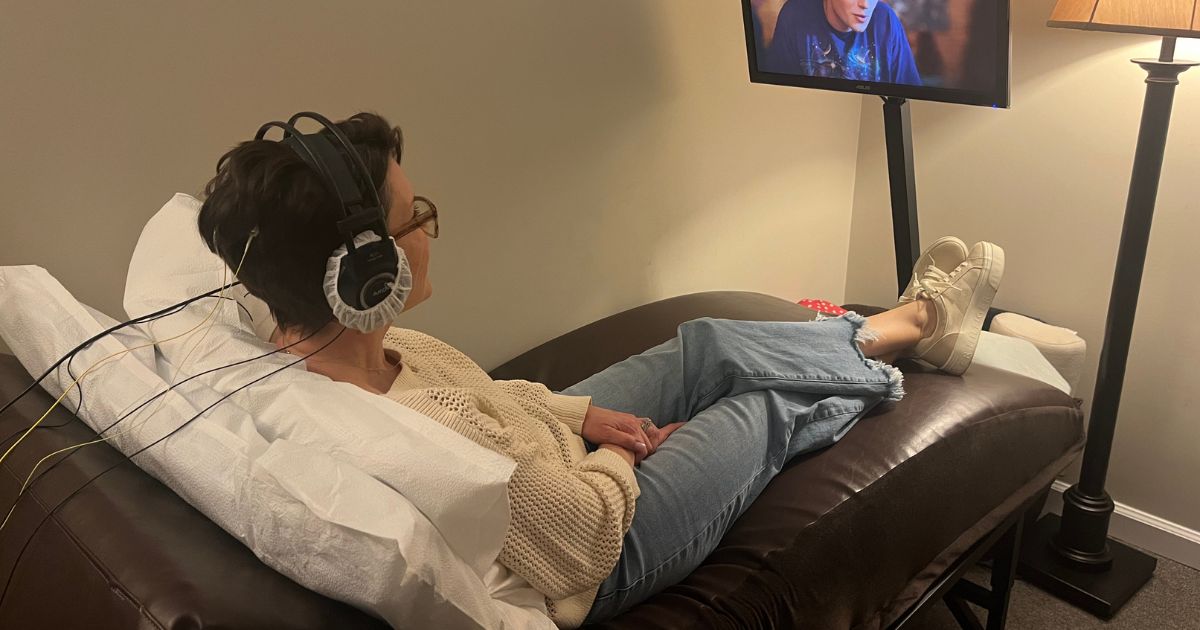
Neurofeedback Vs Medication for Treating Anxiety
Most conventional treatments for anxiety aim to quiet the symptoms—often through medication. While that can bring relief, it doesn’t address the dysfunctional brainwave patterns driving the anxiety. When the medication wears off, the brain returns to its baseline.
Neurofeedback creates lasting change because it doesn’t cover up the problem—it trains the brain to rewire itself. As a safe anxiety treatment without medication, neurofeedback helps retrain brainwave patterns for long-term improvement. After a course of training, many clients report:
- Fewer or no anxiety attacks
- A greater sense of emotional resilience
- Improved sleep
- Clearer thinking and better concentration
- The ability to stay calm in situations that once triggered fear or overwhelm
And unlike short-term fixes, the gains from neurofeedback often continue even after the training ends, because your brain has learned a new way of operating.
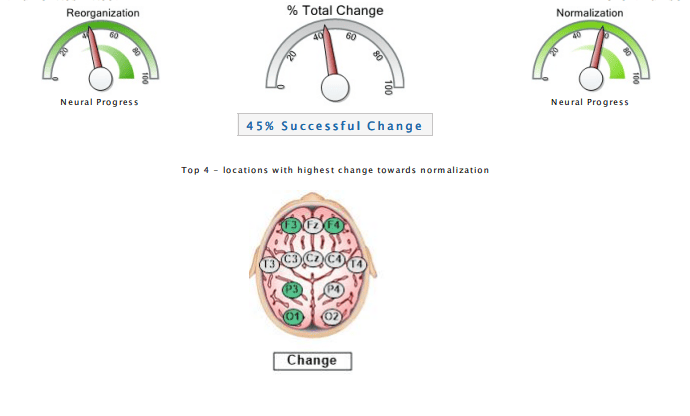
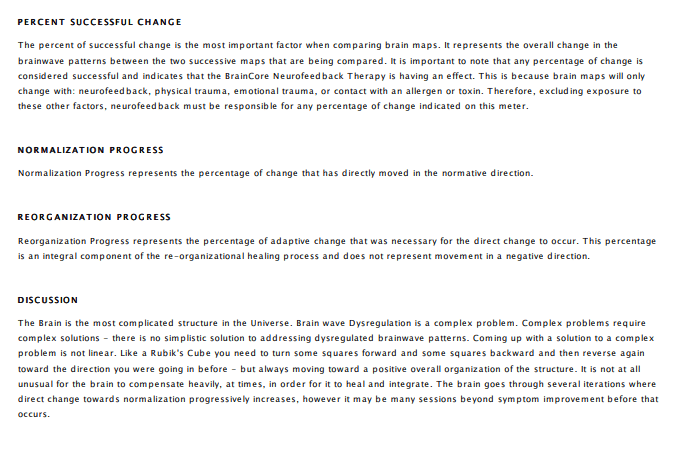
The Research Behind Neurofeedback in Anxiety Treatment
Neurofeedback therapy isn’t fringe science. Neurofeedback is backed by decades of clinical research and is used in top institutions around the world. It is used successfully in treatment and management of various conditions including ADHD, depression, autism, insomnia, chronic stress and anxiety.
Studies have shown that neurofeedback is particularly helpful in managing anxiety symptoms:
- Reduces anxiety symptoms significantly in both adults and children. One 2017 meta-analysis in European Psychiatry found that neurofeedback was as effective as medication in reducing generalized anxiety symptoms, without the side effects.
- Neurofeedback normalizes brainwave patterns associated with anxious and overactive minds. In particular, decreasing excessive beta activity and increasing calming alpha/theta waves has been shown to reduce emotional reactivity and stress sensitivity.
- Improves long-term brain regulation. Research in Clinical EEG and Neuroscience reports sustained improvements in brain regulation even months after training has ended, indicating durable changes in brain function.
In short: neurofeedback works. And it works with your brain, not against it.
Is Neurofeedback Right for You? Start With a Brain Map to Find Out
The first step is getting a brain map. This allows us to see the unique patterns driving your symptoms — and determine if you’re a good candidate for neurofeedback training.
Not everyone with anxiety has the same brain imbalance. That’s why neurofeedback is so effective — it’s personalized, based on your unique neurological data.
If you’ve tried other routes, if you’re tired of temporary solutions, or if you simply want to understand what’s going on in your brain and how to help it—this is your next step.
Let’s map your brain, and finally get to the root of your anxiety.
Ready to Take Control of Your Brain Health?
Book your Brain Map today and discover if neurofeedback is the key to long-lasting anxiety relief.
Your calm brain is possible. Let’s train it together.
About the Author

Dr. Keri Chiappino, DC DACNB BCN
Dr. Keri Chiappino offers a unique, expanded approach to alternative healthcare. With the combination of neurological, orthopedic and chiropractic care, Dr. Chiappino works to restore normal nerve function to the body, promoting optimum health and wellness. Dr. Chiappino has distinguished herself as one of 1000 doctors worldwide achieving Diplomatic status on the American Chiropractic Neurological Board (ACNB), with more than 1000 hours in Chiropractic Neurological coursework. In addition to traditional Chiropractic and Chiropractic Neurological care, Dr. Chiappino also offers BrainCore neurofeedback therapy and our Smithtown office is an authorized BrainCore neurofeedback clinic in Smithtown, NY.
